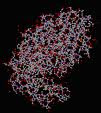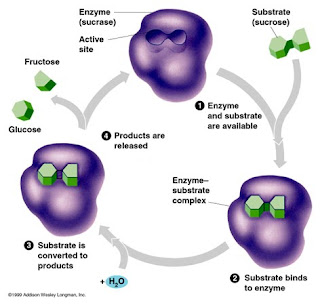Jul 13, 2010
Characteristic of enzymes
Enzymes are the complex organic compounds which are produced by living plants and animals.Enzymes are the chemicals catalysts that control all biochemical reactions in every living thing, from viruses to man. Breathing, digestion, heart action, formation of body tissues, movement of all muscles all these and many more depend on enzymes. So without enzymes these is no life.
Enzymes are protein molecules which act as catalysts to speed up organic reactions in living cells. They are non-living complex nitrogenous compounds produced by living organisms. More than 100,000 different types of enzymes have been identified most of which are colorless solids, soluble in water or dilute solutions, but some are blue, green or greenish brown. Some common enzymes and their specific functions are as follows
Amylase hydrolysis starch into glucose.
Maltase hydrolysis maltose into glucose.
Lactase hydrolysis lactose into glucose and galactose.
Invertase hydrolysis sucrose into glucose and fructose.
Pepsin hydrolysis proteins into amino acids.
Zymase converts glucose into ethanol.
Each enzyme is produced in a particular living cell to catalyze a reaction occurring in that cell.They are the globular proteins which can catalyze various biochemical reactions occurring in the living system. Thus, enzymes are the biological catalysts.
Important characteristics of enzyme catalysis:
- Most of the enzymes are proteins of high molecular weight which from colloidal solutions in water.
- Extremely small amounts of enzymes are able to bring about measurable changes.
- Enzymes are associated with every Chemical reaction that occurs in the living system.
- Enzymes generally accelerate biochemical reactions by reducing the energy requirement (activation energy)
- Enzymes do not alter the amount or nature of the product.
- Enzymes do not affect the amount of energy released or absorbed during the reaction.
- Enzymes retain their identity at the end of the reaction ,as in the beginning .
- Enzymes are highly specific in their action i.e. each enzyme catalyzes only specific type of reaction.
- Enzymes can function at moderate temperature and pH range available in the living system . They lose their catalytic activity at high temperature or in strongly acidic or in alkaline medium.
- Catalytic activity of enzymes is greatly enhanced by the presence of activations or co enzymes . These co enzymes may be metal ions (Na+, Mn++, Cu2+etc) or some other smaller Organic molecule (Vitamins etc).
The deficiency of enzymes in our body can cause few diseases. For example, diseases albinism is caused due to the deficiency of enzyme tyrosinase Phenylketone Urea is caused due to the deficiency of enzyme Phenyl alanine hydroxylase.
Subscribe to:
Post Comments (Atom)



Currently have 0 comments: